高中英语语法易错题:短语动词陷阱题
高中英语高考考点典型陷阱题分析-----动词用法
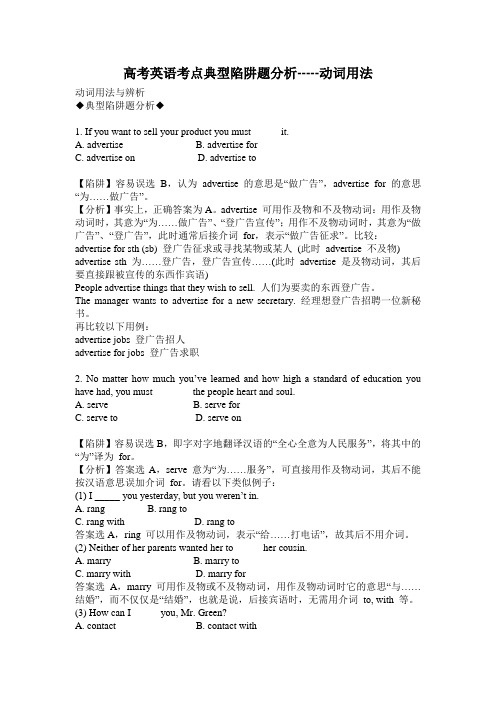
高考英语考点典型陷阱题分析-----动词用法动词用法与辨析◆典型陷阱题分析◆1. If you want to sell your product you must _____ it.A. advertiseB. advertise forC. advertise onD. advertise to【陷阱】容易误选B,认为advertise 的意思是“做广告”,advertise for 的意思“为……做广告”。
【分析】事实上,正确答案为A。
advertise 可用作及物和不及物动词:用作及物动词时,其意为“为……做广告”、“登广告宣传”;用作不及物动词时,其意为“做广告”、“登广告”,此时通常后接介词for,表示“做广告征求”。
比较:advertise for sth (sb) 登广告征求或寻找某物或某人(此时advertise 不及物) advertise sth 为……登广告,登广告宣传……(此时advertise 是及物动词,其后要直接跟被宣传的东西作宾语)People advertise things that they wish to sell. 人们为要卖的东西登广告。
The manager wants to advertise for a new secretary. 经理想登广告招聘一位新秘书。
再比较以下用例:advertise jobs 登广告招人advertise for jobs 登广告求职2. No matter how much you’ve learned and how high a standard of education y ou have had, you must _______ the people heart and soul.A. serveB. serve forC. serve toD. serve on【陷阱】容易误选B,即字对字地翻译汉语的“全心全意为人民服务”,将其中的“为”译为for。
【高考复习】高考英语易错题:动词用法精编陷阱题
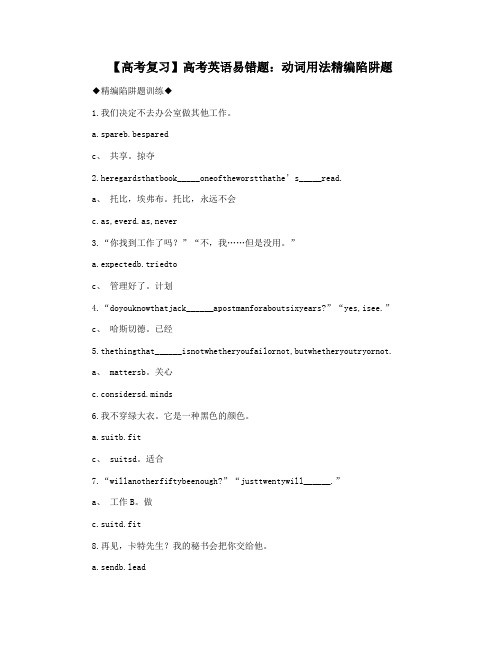
【高考复习】高考英语易错题:动词用法精编陷阱题◆精编陷阱题训练◆1.我们决定不去办公室做其他工作。
a.spareb.besparedc、共享。
掠夺2.heregardsthatbook_____oneoftheworstthathe’s_____read.a、托比,埃弗布。
托比,永远不会c.as,everd.as,never3.“你找到工作了吗?”“不,我……但是没用。
”a.expectedb.triedtoc、管理好了。
计划4.“doyouknowthatjack______apostmanforaboutsixyears?”“yes,isee.”c、哈斯切德。
已经5.thethingthat______isnotwhetheryoufailornot,butwhetheryoutryornot.a、 mattersb。
关心c.considersd.minds6.我不穿绿大衣。
它是一种黑色的颜色。
a.suitb.fitc、 suitsd。
适合7.“willanotherfiftybeenough?”“justtwentywill______.”a、工作B。
做c.suitd.fit8.再见,卡特先生?我的秘书会把你交给他。
a.sendb.leadc、开车。
显示9.thiskindofcancercanbecured,provideditis______early.a、明白了。
获得c.seend.caught10.我们没有为每个人提供任何帮助;你们中的一些人将不得不。
a.helpb.enjoyc、共享。
不用的11.heaskedhertomarryhimandshe_____him.a、回答B。
收到c.acceptedd.agreed12.我最担心的是当我知道这些问题是什么时。
a.doneb.seenc、完成。
实现13.theplanlooksgoodonpaper,butwillit_____?a、工作B。
2012届高考英语陷阱题总结归纳——短语动词
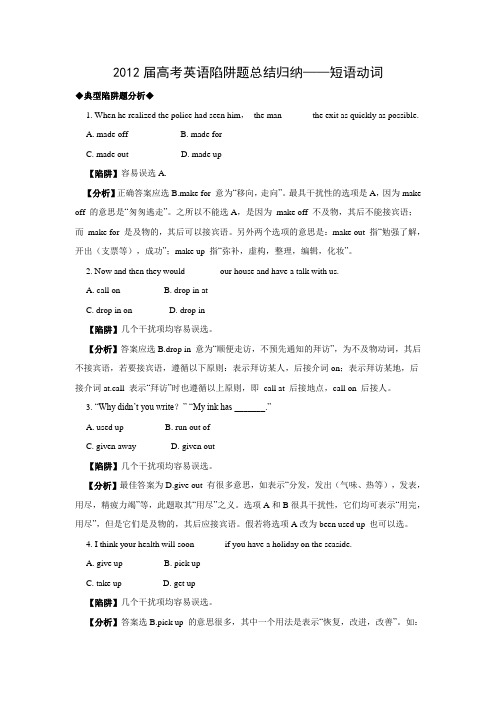
2012届高考英语陷阱题总结归纳——短语动词◆典型陷阱题分析◆1. When he realized the police had seen him,the man ______ the exit as quickly as possible.A. made offB. made forC. made outD. made up【陷阱】容易误选A.【分析】正确答案应选B.make for 意为“移向,走向”。
最具干扰性的选项是A,因为make off 的意思是“匆匆逃走”。
之所以不能选A,是因为make off 不及物,其后不能接宾语;而make for 是及物的,其后可以接宾语。
另外两个选项的意思是:make out 指“勉强了解,开出(支票等),成功”;make up 指“弥补,虚构,整理,编辑,化妆”。
2. Now and then they would ______ our house and have a talk with us.A. call onB. drop in atC. drop in onD. drop in【陷阱】几个干扰项均容易误选。
【分析】答案应选B.drop in 意为“顺便走访,不预先通知的拜访”,为不及物动词,其后不接宾语,若要接宾语,遵循以下原则:表示拜访某人,后接介词on;表示拜访某地,后接介词at.call 表示“拜访”时也遵循以上原则,即call at 后接地点,call on 后接人。
3. “Why didn’t you write?” “My ink has _______.”A. used upB. run out ofC. given awayD. given out【陷阱】几个干扰项均容易误选。
【分析】最佳答案为D.give out 有很多意思,如表示“分发,发出(气味、热等),发表,用尽,精疲力竭”等,此题取其“用尽”之义。
选项A和B很具干扰性,它们均可表示“用完,用尽”,但是它们是及物的,其后应接宾语。
易错点08 非谓语动词(5大陷阱)-备战2024年高考英语考试易错题(解析版)
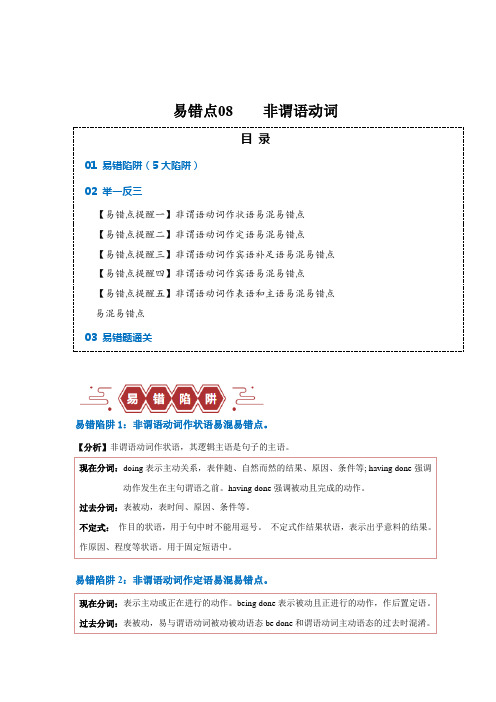
易错点08 非谓语动词目录01 易错陷阱(5大陷阱)02 举一反三【易错点提醒一】非谓语动词作状语易混易错点【易错点提醒二】非谓语动词作定语易混易错点【易错点提醒三】非谓语动词作宾语补足语易混易错点【易错点提醒四】非谓语动词作宾语易混易错点【易错点提醒五】非谓语动词作表语和主语易混易错点易混易错点03 易错题通关易错陷阱1:非谓语动词作状语易混易错点。
【分析】非谓语动词作状语,其逻辑主语是句子的主语。
易错陷阱2:非谓语动词作定语易混易错点。
易错陷阱4:非谓语动词作宾语易混易错点。
易错陷阱5:非谓语动词作表语和主语易混易错点。
【易错点提醒一】非谓语动词作状语易混易错点【例1】(广东省2023-2024学年6校高三联考)The tablet, (find) in Jindong Village, measures 1.4 meters high, 0.61 meters wide, and 0.14 meters thick.【答案】found【解析】考查非谓语动词。
句意:这块石碑出土于金洞村,高1.4米,宽0.61米,厚0.14米。
本句的谓语动词是measures,所以该空在这里作定语,修饰The tablet,且与逻辑主语为被动关系,故填动词的-ed形式。
故填found。
【变式1】(广东省六校2023-2024学年高三第一次联考试题)Dr. Wang began to question the umbrella species narrative and carried out research, only (find) that panda conservation had not helped large carnivores in China.【变式2】(广东省广东省四校联考2023-2024学年高三9月试题)The study, which appeared in the journal PLOS Medicine,indicates that individuals who take in higher-than-average amounts of【变式3】(2023年广东高三模拟)_______ (dress) in a full body suit of ice, a symbol of purity and【解析】考查非谓语动词。
2019-2020年高考英语 短语动词陷阱题总结归纳 新人教版

2019-2020年高考英语短语动词陷阱题总结归纳新人教版◆典型陷阱题分析◆1. When he realized the police had seen him, the man ______ the exit as quickly as possible.A. made offB. made forC. madeout D. made up【陷阱】容易误选A.【分析】正确答案应选B.make for 意为“移向,走向”。
最具干扰性的选项是A,因为make off 的意思是“匆匆逃走”。
之所以不能选A,是因为 make off 不及物,其后不能接宾语;而 make for 是及物的,其后可以接宾语。
另外两个选项的意思是:make out 指“勉强了解,开出(支票等),成功”;make up 指“弥补,虚构,整理,编辑,化妆”。
2. Now and then they would ______ our house and have a talk with us.A. call onB. drop in atC. drop inon D. drop in【陷阱】几个干扰项均容易误选。
【分析】答案应选B.drop in 意为“顺便走访,不预先通知的拜访”,为不及物动词,其后不接宾语,若要接宾语,遵循以下原则:表示拜访某人,后接介词on;表示拜访某地,后接介词at.call 表示“拜访”时也遵循以上原则,即 call at 后接地点,call on 后接人。
3. “Why didn’t you write?” “My ink has _______.”A. used upB. run out ofC. givenaway D. given out【陷阱】几个干扰项均容易误选。
【分析】最佳答案为D.give out 有很多意思,如表示“分发,发出(气味、热等),发表,用尽,精疲力竭”等,此题取其“用尽”之义。
新高考专用备战2024年高考英语易错题精选易错点08非谓语动词5大陷阱学生版

易错点08非谓语动词易错陷阱1:非谓语动词作状语易混易错点。
【分析】非谓语动词作状语,其逻辑主语是句子的主语。
现在分词:doing表示主动关系,表伴随、自然而然的结果、原因、条件等;having done强调动作发生在主句谓语之前。
having done强调被动且完成的动作。
过去分词:表被动,表时间、原因、条件等。
不定式:作目的状语,用于句中时不能用逗号。
不定式作结果状语,表示出乎意料的结果。
作原因、程度等状语。
用于固定短语中。
易错陷阱2:非谓语动词作定语易混易错点。
现在分词:表示主动或正在进行的动作。
being done表示被动且正进行的动作,作后置定语。
过去分词:表被动,易与谓语动词被动被动语态be done和谓语动词主动语态的过去时混淆。
不定式:需跟不定式的名词:ability,attempt,decision,effort,failure,way,promise等。
易错陷阱3:现在分词与过去分词作补语易混易错点。
现在分词:作宾补时,表示主动或正进行。
过去分词:在表示感觉或心理状态的动词后作宾补。
如:see,watch,observe,look at,hear,li sten to,notice,feel等;在“使”动词后作宾补。
如:have,get,keep,leave,make等。
不定式:常跟不定式作宾补的动词:allow,ask,beg,cause,command,elect,forbid,force,get,help, intend,invite,would like,order,permit,persuade,prefer,request,teach,advise,wish,encourage, instruct,urge等.易错陷阱4:非谓语动词作宾语易混易错点。
常跟动名词作宾语的动词或短语:finish,practice,enjoy,mind,avoid,admit,appreciate,feel like,suggest,stand,risk,consider,escape,miss,delay,dislike,imagine,understand,look forward to,insist on,be busy,can't help,get down to,be worth等。
高中英语语法易错题:动词语法陷阱题
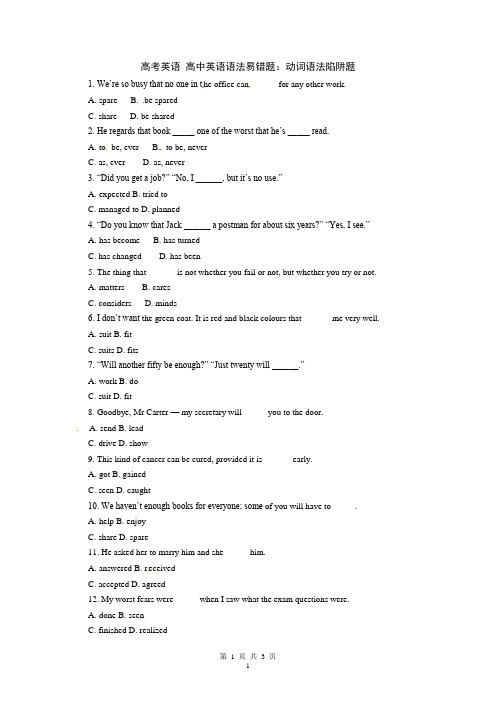
高考英语高中英语语法易错题:动词语法陷阱题1. We’re so busy that no one in t he office can_____ for any other work.A. spareB. be sparedC. shareD. be shared2. He regards that book _____ one of the worst that he’s _____ read.A. to be, everB.to be, neverC. as, everD. as, never3. “Did you get a job?” “No, I ______, but it’s no use.”A. expectedB. tried toC. managed toD. planned4. “Do you know that Jack ______ a postman for about six years?” “Yes, I see.”A. has becomeB. has turnedC. has changedD. has been5. The thing that ______ is not whether you fail or not, but whether you try or not.A. mattersB. caresC. considersD. minds6. I don’t want the green coat. It is red and black colours that ______ me very well.A. suitB. fitC. suitsD. fits7. “Will another fifty be enough?” “Just twenty will ______.”A. workB. doC. suitD. fit8. Goodbye, Mr Carter — my secretary will _____ you to the door.A. sendB. leadC. driveD. show9. This kind of cancer can be cured, provided it is ______ early.A. gotB. gainedC. seenD. caught10. We haven’t enough books for everyone; some of you will have to _____.A. helpB. enjoyC. shareD. spare11. He asked her to marry him and she _____ him.A. answeredB. r eceivedC. acceptedD. agreed12. My worst fears were _____ when I saw what the exam questions were.A. doneB. seenC. finishedD. realized13. The plan looks good on paper, but will it _____?A. workB. passC. agreeD. does14. What’s the matter with the radio? Why isn’t it _____?A. broadcastingB. workingC. doingD. sounding15. High unemployment _____ the government billions of pounds in lost taxes.A. spendsB. takesC. usesD. costs16. It’s hard to rescue drowning people because they _____ so much.A. sinkB. swimC. jumpD. struggle17. She went to the station to meet her husband, but _____ him in the crowd.A. passedB. recognizedC. missedD. lost18. I m issed what was happening because I wasn’t ______ ver y closely.A. noticingB. runningC. watchingD. glancing19. If you lend me a pound, it will _____ me having to go to the bank.A. saveB. shareC. serveD. help20. Don’t _______ your breath trying to persuade them; they’ll never listen.A. useB. wasteC. spendD. put21. He has spent little time on his lessons this term, so h e _____ to fail the exam.A. expectsB. hopesC. wishesD. requir es22. He will never ______ anything if he doesn’t work hard.A. hopeB. wishC. achieveD. succeed答案与解析1. 选B,spare 在表示“腾出或省去(多余的人或物)”。
2024年高考英语易错题(新高考专用)易错点07动词的时态和语态(4大陷阱)

易错点07 动词的时态和语态目录01 易错陷阱(4大陷阱)02 举一反三【易错点提醒一】一般现在时、一般过去时和现在完成时易混易错点【易错点提醒二】一般过去时和过去完成时易混易错点【易错点提醒三】现在完成时和过去完成时易混易错点【易错点提醒四】主动语态与被动语态易混易错点03 易错题通关易错陷阱1:一般现在时、一般过去时和现在完成时易混易错点。
【分析】【高考链接】(2023年浙江卷1月)The large siheyuan of these highranking officials and wealthy businessmen often________ (feature)beautifully carved and painted roof beams and pillars(柱子).【答案】featured【解析】考查动词时态。
句意:这些高级官员和有钱商人的高大的四合院,通常以雕刻精美和被粉刷的房顶横梁和柱子为特点。
分析句子结构可知,空格处需要填谓语动词,再结合and后动词时态可知,空格处应用一般过去时。
故填featured。
易错陷阱2:一般过去时和过去完成时易混易错点。
【分析】1.下列动词hope、wish、expect、think、intend、mean、suppose等,用过去完成时表示“原本……(事实上未能……)”。
2.This/It/That was the first/second/third ... time that ...表示“这/那是(某人)第几次做某事”,that从句中要用过去完成时。
3.hardly ... when ...和no sooner ... than ...两个句型中,主句均用过去完成时。
易错陷阱3:现在完成时和过去完成时易混易错点。
【分析】易错陷阱4:主动语态和被动语态易混易错点。
【分析】➢受母语干扰,翻译上下文时混淆被动语态与主动语态。
➢混淆谓语动词被动语态构词be+done与非谓语动词重点过去分词done。
备战高考英语语法备考 短语动词考点典型陷阱分析练习
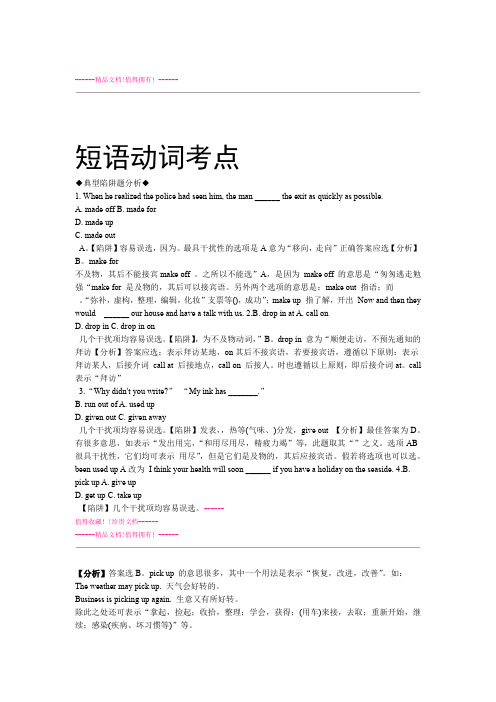
------精品文档!值得拥有!------短语动词考点◆典型陷阱题分析◆1. When he realized the police had seen him, the man ______ the exit as quickly as possible.A. made offB. made forD. made upC. made outA。
【陷阱】容易误选,因为。
最具干扰性的选项是A意为“移向,走向”正确答案应选【分析】B。
make for不及物,其后不能接宾make off 。
之所以不能选”A,是因为make off 的意思是“匆匆逃走勉强“make for 是及物的,其后可以接宾语。
另外两个选项的意思是:make out 指语;而。
“弥补,虚构,整理,编辑,化妆”支票等(),成功”;make up 指了解,开出Now and then they would ______ our house and have a talk with us. 2.B. drop in at A. call onD. drop in C. drop in on几个干扰项均容易误选。
【陷阱】,为不及物动词,”B。
drop in 意为“顺便走访,不预先通知的拜访【分析】答案应选;表示拜访某地,on其后不接宾语,若要接宾语,遵循以下原则:表示拜访某人,后接介词call at 后接地点,call on 后接人。
时也遵循以上原则,即后接介词at。
call 表示“拜访”3.“Why didn't you write?”“My ink has _______.”B. run out of A. used upD. given out C. given away几个干扰项均容易误选。
【陷阱】发表,,热等(气味、)分发,give out 【分析】最佳答案为D。
有很多意思,如表示“发出用完,“和用尽用尽,精疲力竭”等,此题取其“”之义。
【高考复习】高考英语易错考点动词用法常见陷阱分析
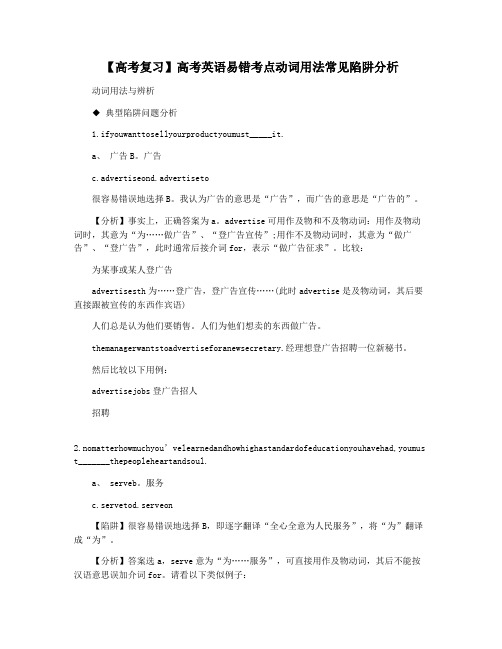
【高考复习】高考英语易错考点动词用法常见陷阱分析动词用法与辨析◆ 典型陷阱问题分析1.ifyouwanttosellyourproductyoumust_____it.a、广告B。
广告c.advertiseond.advertiseto很容易错误地选择B。
我认为广告的意思是“广告”,而广告的意思是“广告的”。
【分析】事实上,正确答案为a。
advertise可用作及物和不及物动词:用作及物动词时,其意为“为……做广告”、“登广告宣传”;用作不及物动词时,其意为“做广告”、“登广告”,此时通常后接介词for,表示“做广告征求”。
比较:为某事或某人登广告advertisesth为……登广告,登广告宣传……(此时advertise是及物动词,其后要直接跟被宣传的东西作宾语)人们总是认为他们要销售。
人们为他们想卖的东西做广告。
themanagerwantstoadvertiseforanewsecretary.经理想登广告招聘一位新秘书。
然后比较以下用例:advertisejobs登广告招人招聘2.nomatterhowmuchyou’velearnedandhowhighastandardofeducationyouhavehad,youmus t_______thepeopleheartandsoul.a、 serveb。
服务c.servetod.serveon【陷阱】很容易错误地选择B,即逐字翻译“全心全意为人民服务”,将“为”翻译成“为”。
【分析】答案选a,serve意为“为……服务”,可直接用作及物动词,其后不能按汉语意思误加介词for。
请看以下类似例子:(1)我昨天和你在一起,但你不在。
a.rangb.rangtoc、朗格威德。
朗托答案选a,ring可以用作及物动词,表示“给……打电话”,故其后不用介词。
(2)她的父母都不想让她成为她的表亲。
a.marryb.marrytoc、结婚了。
结婚答案选a,marry可用作及物或不及物动词,用作及物动词时它的意思“与……结婚”,而不仅仅是“结婚”,也就是说,后接宾语时,无需用介词to,with等。
【高考复习】高考英语易错考点非谓语动词常见陷阱分析
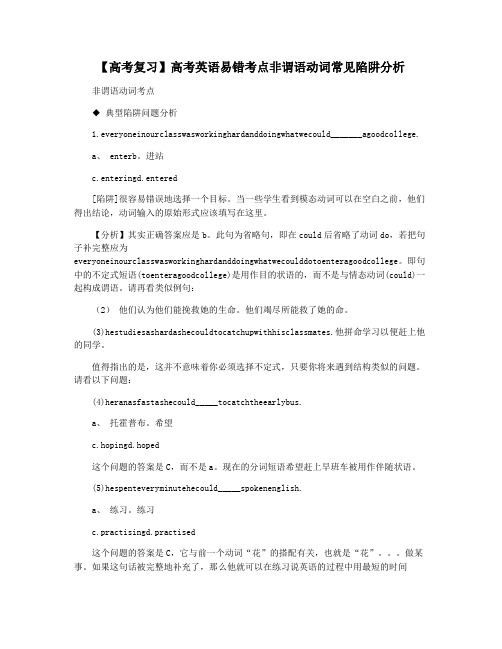
【高考复习】高考英语易错考点非谓语动词常见陷阱分析非谓语动词考点◆ 典型陷阱问题分析1.everyoneinourclasswasworkinghardanddoingwhatwecould_______agoodcollege.a、 enterb。
进站c.enteringd.entered[陷阱]很容易错误地选择一个目标。
当一些学生看到模态动词可以在空白之前,他们得出结论,动词输入的原始形式应该填写在这里。
【分析】其实正确答案应是b。
此句为省略句,即在could后省略了动词do,若把句子补完整应为everyoneinourclasswasworkinghardanddoingwhatwecoulddotoenteragoodcollege。
即句中的不定式短语(toenteragoodcollege)是用作目的状语的,而不是与情态动词(could)一起构成谓语。
请再看类似例句:(2)他们认为他们能挽救她的生命。
他们竭尽所能救了她的命。
(3)hestudiesashardashecouldtocatchupwithhisclassmates.他拼命学习以便赶上他的同学。
值得指出的是,这并不意味着你必须选择不定式,只要你将来遇到结构类似的问题。
请看以下问题:(4)heranasfastashecould_____tocatchtheearlybus.a、托霍普布。
希望c.hopingd.hoped这个问题的答案是C,而不是a。
现在的分词短语希望赶上早班车被用作伴随状语。
(5)hespenteveryminutehecould_____spokenenglish.a、练习。
练习c.practisingd.practised这个问题的答案是C,它与前一个动词“花”的搭配有关,也就是“花”。
做某事。
如果这句话被完整地补充了,那么他就可以在练习说英语的过程中用最短的时间(6)beforegoingabroadhedevotedallhecould____d____hisoralenglish.a、即兴表演。
专题14 短语动词陷阱题-2019年最新高中英语语法易错题通关秘籍
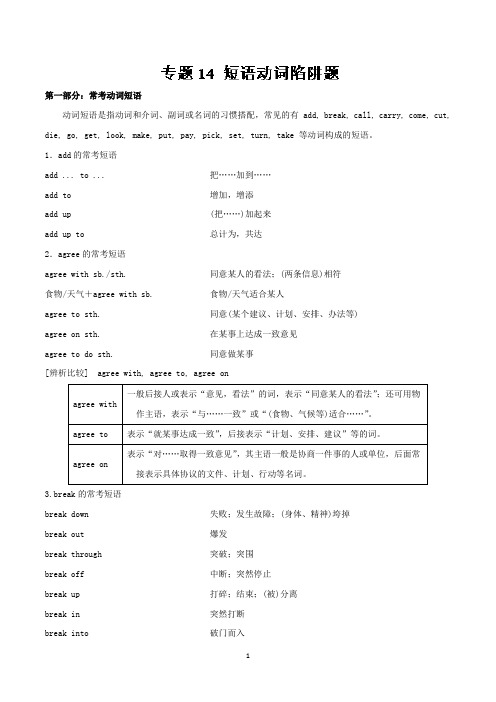
第一部分:常考动词短语动词短语是指动词和介词、副词或名词的习惯搭配,常见的有 add, break, call, carry, come, cut, die, go, get, look, make, put, pay, pick, set, turn, take 等动词构成的短语。
1.add的常考短语add ... to ... 把……加到……add to 增加,增添add up (把……)加起来add up to 总计为,共达2.agree的常考短语agree with sb./sth. 同意某人的看法;(两条信息)相符食物/天气+agree with sb. 食物/天气适合某人agree to sth. 同意(某个建议、计划、安排、办法等)agree on sth. 在某事上达成一致意见agree to do sth. 同意做某事[辨析比较] agree with, agree to, agree on3.break的常考短语break down 失败;发生故障;(身体、精神)垮掉break out 爆发break through 突破;突围break off 中断;突然停止break up 打碎;结束;(被)分离break in 突然打断break into 破门而入break away 突然离开;逃脱;脱离4.bring的常考短语bring about 引起;导致bring back 拿回来;使恢复bring down 打倒;使降低bring in 引进;赚得bring out 出版;使显现bring up 提出;养育;呕吐5.carry的常考短语carry on 继续,坚持carry out 执行,实施carry through 渡过(难关);完成,实现6.come的常考短语come from 来自于……come about 发生come over 从远处来;顺便来访come out 出来,出现;出版come by 从旁边经过come up 走近;发生;出现;长出地面,发芽;被提及come up with 想出(计划或想法)come across 偶遇come along 出现;进步;一起来come after 追赶come back 回来come around 苏醒come on 快点;振作起来;得了吧7.cut的常考短语cut in 插嘴;打断cut into 切入cut across 抄近路通过cut back 减少cut off 切断cut up 切碎cut away 砍掉cut down 砍倒;削减cut out 剪取,剪掉cut through 穿过;克服8.call的常考短语call after 以……的名字来命名call for 要求call off 取消call back 回电+话;收回call up 使想起;给……打电+话call on 号召;拜访(某人)call in 叫……进来;召来9.die的常考短语die away (声音、风、光线、情绪等)逐渐消失die down 逐渐平息die of 死于(疾病、衰老、饥饿等)die from 死于(意外事故或未知的原因)die out 灭绝,绝种die off 相继死去10.end的常考短语end up doing sth. 最终做某事end (up) in 以……告终;结果为……end (up) with 以……结束(指以某种方式结束) 11.get的常考短语get about 走动;传播get down to 开始认真做get through 通过;熬过;打通(电+话) get in 到达;入选;当选get on 上(车);进展;相处get off 下(车);动身get out 出去;离去get over 克服;恢复get across 使被理解;通过get along 相处;进展get away 离开;脱身;逃脱12.give的常考短语give up 放弃give in 屈服:让步give away 赠送,捐赠;无意中泄露give over 停止;放弃give off 散发;发出give out 分发;散发;用完give back 归还13.go的常考短语go against 违背go along 进展;前进go around 参观;传播go away 离开;消失go beyond 超过go by (时间)流逝;遵循go down 下降go up 上升go in for 喜欢;参加go off 离开;爆炸go on 继续go over 复习;仔细检查go out 外出;熄灭go through 彻底检查;熬过;通过go without 没有……也行(也可以勉强对付) go ahead 进行,发生;开始做(with) 14.hold的常考短语hold up 支撑;承受住;延误;推迟;举起hold back 控制(情感);阻止hold on 坚持;别挂(电+话)hold together (使)团结一致hold on to 守住;抓住不放hold down 压制;限制hold out (在困境中)坚持;伸出15.keep的常考短语keep away (from) 使远离keep back 扣下;隐瞒keep off 避开;使不接近keep on 继续keep out 阻止进入;(警示语)请勿靠近keep up 跟上;赶上;继续;持续keep up with 跟上;赶上;与……保持联系16.look的常考短语look after 照顾;照料look around 参观;寻找look at 看look down 朝下看look for 寻找look into 调查look out 向外看;当心look over 浏览;快速查看look through 浏览;仔细查阅look up 向上看;查阅look up to 尊敬look down upon 看不起look forward to 盼望17.make的常考短语make up for 补偿;弥补make out 辨认出;理解make fun of 取笑make up one’s mind 某人下定决心make sense 有道理;讲得通make good/full use of 充分利用make up 编造;组成,构成;化妆make progress 取得进步18.pick的常考短语pick out 挑出;区别出,分辨出pick up 拿起,捡起;收拾;偶然获得,学会;接收(信号);(开车)去接;(顺便)捎带;染上(疾病)19.put的常考短语put aside 把……放在一边;不理睬;储存put away 把……收拾好;存钱put back 把……放回原处;推迟put down 放下;记下;镇压put forward 提出(建议)put in 加入;投入put off 推迟;拖延put on 穿上,戴上;增加;上演put out 熄灭;出版;生产put up 举起;张贴;搭建;安排住宿put up with 容忍,忍受20.send的常考短语send away 命令……离开,把………打发走send for 请(某人)来send out 发送;派遣send up 使上升;发射21.stand的常考短语stand for 代表;主张;象征stand out 突出;显眼;杰出stand by 袖手旁观;准备行动stand aside 站到一边;让开;袖手旁观;不参与22.set的常考短语set about 开始做;着手做set aside 留出;暂不考虑;把……放到一边set down 记下;放下;让(乘客)下车set off 出发;引爆;引起set out 开始;出发,动身set up 创建,创立23.take的常考短语take away 拿走;带走;消除(病痛)take apart 拆开;拆散take along 带上;随身带上take after (性格、外貌等)像……take down 记下;拆除take ... for granted 认为……理所当然take in 吸收;收留,理解,领会;欺骗take off 起飞;脱下;休假;走红;(事业)腾飞take over 接手;接管,接任take on 呈现;雇用take to 开始喜欢;开始养成……的习惯take part in 参加take up 拿起;开始从事;占据(时间或空间)24.turn的常考短语turn around/round 转身;好转,有起色turn against (使)反对(某人);与……为敌turn away 不准……入内turn back 掉转头,折回turn down 调低,关小;拒绝turn in 上交;交还turn into (使)变成turn off 关掉turn on 打开turn out 结果是;生产,制造turn over 把……翻过来;移交turn to 求助于;转向turn up 调高;到来,出现第二部分:课堂实战1. To our surpr ise the stranger _____ to be an old friend of my mother’s.A. turned outB. turned upC. set outD. set up【答案】Aturn out 意为“结果是,原来是”等;turn up 意为“找到,发现,出现,开大音量”等;set out 意为“开始,出发,陈述”等;set up 意为“设立,竖立,架起,升起,创(纪录),提出”等。
高考英语复习试题:动词短语考点典型陷阱题分析
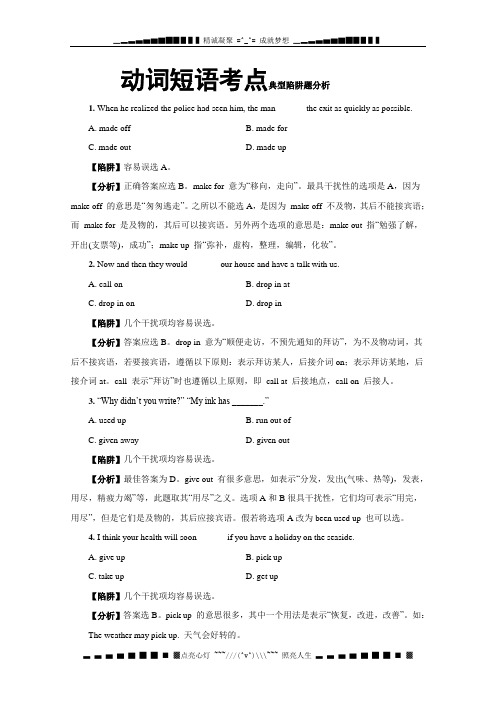
动词短语考点典型陷阱题分析1. When he realized the police had seen him, the man ______ the exit as quickly as possible.A. made offB. made forC. made outD. made up【陷阱】容易误选A。
【分析】正确答案应选B。
make for 意为“移向,走向”。
最具干扰性的选项是A,因为make off 的意思是“匆匆逃走”。
之所以不能选A,是因为make off 不及物,其后不能接宾语;而make for 是及物的,其后可以接宾语。
另外两个选项的意思是:make out 指“勉强了解,开出(支票等),成功”;make up 指“弥补,虚构,整理,编辑,化妆”。
2. Now and then they would ______ our house and have a talk with us.A. call onB. drop in atC. drop in onD. drop in【陷阱】几个干扰项均容易误选。
【分析】答案应选B。
drop in 意为“顺便走访,不预先通知的拜访”,为不及物动词,其后不接宾语,若要接宾语,遵循以下原则:表示拜访某人,后接介词on;表示拜访某地,后接介词at。
call 表示“拜访”时也遵循以上原则,即call at 后接地点,call on 后接人。
3.“Why didn’t you write?” “My ink has _______.”A. used upB. run out ofC. given awayD. given out【陷阱】几个干扰项均容易误选。
【分析】最佳答案为D。
give out 有很多意思,如表示“分发,发出(气味、热等),发表,用尽,精疲力竭”等,此题取其“用尽”之义。
选项A和B很具干扰性,它们均可表示“用完,用尽”,但是它们是及物的,其后应接宾语。
2023年高考英语陷阱题总结归纳动词时态附详解

高考英语陷阱题总结归纳——动词时态◆经典陷阱题分析◆.1.“.____.hi.telephon.number..“.hav.hi.number.bu..___.t.brin.m.phon.book.”.A.forget.forget .B.forgot.forgot.C.forget.forgot .D.forgot.forget【陷阱】轻易误选A, 认为“忘掉”是目前旳事。
【分析】仔细体会一下对话旳语境:第一种人说“我忘掉他旳电话号码了”, 这个“忘掉”应当是目前旳状况, 即目前忘掉了, 要否则就没有必要同对方说此话了, 故第一空应填forget;第二个人说“我有他旳号码, 但我忘掉带电话本了”, 这个“忘掉”应当是过去旳状况, 即过去忘掉带电话本, 因此目前电话本不在身上(注意句中旳转折连词but), 故第二空应填forgot, 即答案选应C.请再看一例:— Oh, I ______ where he lives.—Don’t you carry your address book?No, I ______ to bring it..A.forget.forget .B.forgot.forgot.C.forget.forgot .D.forgot.forget答案选C, 理由同上。
.2..ha.hope.t.se.he.of.a.th.station.bu..____.to.busy..A.was .B.ha.been.C.woul.be .D.woul.hav.been【陷阱】轻易误选B或D, 认为前句用了had hoped, 因此此句谓语要用B或D与之呼应。
【分析】但对旳答案为A, 前一句谓语用had hoped, 表达旳是过去未曾实现旳想法或打算, 可以译为“本想”, 而后一句说“我太忙”, 这是陈说过去旳一种事实, 因此要用一般过去时。
请做如下类似试题(答案均为A):(1)We had hoped to catch the 10: 20 train, but _____ it was gone..C.woul.find .D.woul.hav.found(2)We had hoped that you would be able to visit us, but you _____..A.didn’t .B.hadn’t.C.needn’t .D.woul.no.have(3)We had wanted to come to see him, but we ____ no time..A.had .B.ha.had.C.woul.have .D.woul.hav.had.(s.night.bu.someon._____.an..couldn’.ge.away..A.called.B.ha.called.C.woul.cal. D.woul.hav.called(5)The traffic accident wouldn’t have happened yesterday, but the driver _______ really careless..A.wa. B.is.C.wer. D.ha.bee.3.Dea.me.Jus.____.a.th.time..____te..A.look.have.B.looking.had.C.look.ha. D.looking.have【陷阱】此题轻易误选D, 认为第一空用目前分词表伴随, 第二空填have 旳一般目前时, 以保持与前面时态旳一致性。
高考英语典型“陷阱题”50例(含答案解析)

高考英语典型“陷阱题〞50例〔含答案解析〕同学们在平时做题的过程中有没有发现这样的现象:有些题目看起来似曾相识,轻而易举就可选出"正确答案",结果往往发现自己错了。
这些题目就是我们所说的"陷阱题"。
它们看似简单,实如此不易解答。
出题者往往设下"陷阱",如果大家用固定的思维方式去考虑,就会误选答案。
近年来,高考试卷中也常有这种性质的试题出现。
当同学们遇到这种题时,既不可"轻易下手",也不可不知所措,而应做到先三思而后行。
首先,同学们要认真审题,发现"陷阱"。
要灵活地运用语法规如此,理顺思路,寻找"陷阱"。
其次,要运用多向思维,分析"陷阱"。
不要用习惯的、单一的、片面的思维去解题。
再次,要去伪存真,识别"陷阱"。
要抓住根本知识点与特殊现象,不厌其烦地归纳理解,认清选择题目中的"鱼目"与"珍珠",防止落入"陷阱"。
最后就是要加强验证,跳出"陷阱"。
这就要求学习者要有良好的检查验证习惯,掌握验证的方法,即使落入了"陷阱",也能在验证过程中,发现"陷阱",并迅速地跳出来。
下面是-些比拟典型的"陷阱题".请大家做做看:1. Mr Wang made up his mind to devote all he could ______ his oral English before going abroad.A. improveB. to improveC. improvingD. to improving2. Everything he ______ away from him before he returned to his hometown.A. tookB. had been takenC. had had been takenD. had taken3. Before he went abroad,he spent as much time as he _____ English.A. could learningB. learnedC. to learnD. could learn4. You can never imagine what great difficuly I have ______ your house.A. foundB. findingC. to findD. for finding5. The person we spoke to ______ no answer at first.A. makingB. makesC. makeD. made6. The person we referred to ______ us a report tomorrow.A. givingB. will giveC. gaveD. give7. The days we have been looking forward to _______ soon.A. comingB. will comeC. cameD. have come8. The person we talked about ______ our school last week.A. visitingB. will visitC. visitedD. has visited9. The man whose songs we are fond of ______ in our city next week.A. singingB. to singC. will singD. sang10. Not only ______ the jewelry she _____ been sold for her son's gambling debts but also her house.A. is;hasB. has;hadC. has;hasD. 不填;has11. ______ in thought,he almost ran into the car in front of him.A. LosingB. Having lostC. LostD. To lose12. The research is so designed that once nothing can be' done to change it.A. beginsB. having begunC. beginningD. begun13. - What do you think made the woman so upset?- _______ weight.A. As she put onB. Put onC. Putting onD. Because of putting on14. Time should be made good use of ______ our lessons well.A. learningB. learnedC. to learnD. having learned15. It was only with the help of the local guide ______.A. was the mountain climber rescuedB. then the mountain climber was rescuedC. when the mountain climber was rescuedD. that the mountain climber was rescued16. Never ______ time come again.A. has lostB. will loseC. will lostD. lose17. - ______ was it ______ they discovered the entrance to the underground palace?- Totally by chance.A. What;thatB. How;thatC. When;howD. Where;that18. I have nothing to confess. ______ you want me to say?A. What is it thatB. What it is whatC. How is it thatD. How it is that19. Is this factory ______ you visited the other day?A. the oneB. thatC. whereD.when20. Was it _____ she heard with her ears really made her frightened?A:what;that B. it;that C. that;which D. what;不填21. ______ what the six blind men said sounded!A. How foolishlyB. How foolishC. What foolishlyD. What foolish22. It was ______ the old clock that the old man spent the whole morning at home.A. repairB. repairingC. to repairD. in repair23. Is this hotel ______ you said we were to stay in your letter?.A. thatB. whereC. the oneD. in which24. Please tell me the way you thought of ______ the garden.A. take care ofB. to take care ofC. takinq care ofD. how to take care of25. A fast-food restaurant is the place _______,just as the name suggests,eating is performed quickly.A. whichB. whereC. thereD. what26. The film brought the hours back to me ______ I was taken good care of in that far-away village.A. untilB. thatC. whenD. where27. The professor has written another book,________ of great importance to cornputer science.A. which I think it isB. and I think isC. which I think isD. when I think is28. - Where do you think ______ he ______ the computer?- Sorry,I have no idea.A. had;boughtB. has;boughtC. did;buyD. 不填;bought29. We should do more such exercises in the future,I think,_____ those we did yesterday.A. asB. likeC. aboutD. than30. He will tell you _____ he expects will win such a match.A. whyB. whomC. whichD. who31. In New Zealand,I made lots of friends _____ a very practical knowledge of the English language.A. getB. togetC. gettingD. got32. I'm busy now. I'm sorry I can't help _____ the flowers.A. watedngB. wateredC. watersD. to water33. Who would you rather ______ the report instead of you?A. have writeB. have to writeC. writeD. have written34. We must stop pollution ______ longer.A. livingB. from livingC. to liveD. live35. - Was it under the tree ______ you were away talking to a friend?- Sure. But when I get back there,the bike was gone.A. thatB.whereC. whichD. while36. Not far from the club there was a garden,______ owner seated in it playing bridge with his children every aftemoon.A. whoseB. itsC. whichD. that37. Wang Ling was elected ______ all he is the tallest.A. becauseB. because ofC. forD. as38. We'll be free tomorrow,so I suggest ______ to the history museum.A. to visitB. visitingC. we should visitD. a visit39. I like swimming,while what my brother enjoys ______.A. cookingB. to cookC. is cookingD. cook40. Thank you for the trouble you have ______ to help me.A. paidB. takenC. hadD. asked41. Who is it up _______ decide whether to goor not?A. to toB. for forC. to forD. for to42. We keep in touch ______ writing often.A. withB. ofC. onD. by43. - How long have you been here?- ______ the end of last month,A. InB. ByC.AtD. Since44. You should treat him (in) the way ______ suits him most.A. thatB. in whichC. 不填D. why45. He insisted that the sky ______ clear up the following day.A. wouldB. shouldC. 不填D. be46. He is a strict but kind-hearted father,______ the children respect but are afraid of.A.不填B. thatC. for whomD. one whom47. Mr Smith is ______ a good teacher ______ we all respect.A. such;thatB. such;asC. so;thatD. so;as48. ______ nice,the food was all eaten up soon.A. TastingB. TasteC. TastedD. To taste49. - You haven't been to Beijing,have you?-______. And how I wish to go there again!A. Yes,t haveB. Yes,I haven'tC. No,I haveD. No,I haven't50. He was sentenced to death ______ what he has stolen from the bank.A. thatB. sinceC. becauseD. because of答案与辨析:1.此题中包含固定短语devote…to,其中to为介词,后面应接动名词。
高中英语语法易错题:短语动词陷阱题
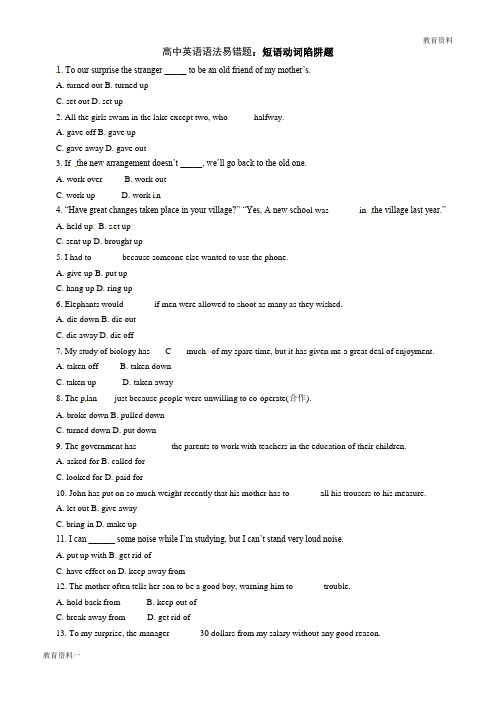
高中英语语法易错题:短语动词陷阱题1. To our surprise the stranger _____ to be an old friend of my mother’s.A. turned outB. turned upC. set outD. set up2. All the girls swam in the lake except two, who _____ halfway.A. gave offB. gave upC. gave awayD. gave out3. If the new arrangement doesn’t _____, we’ll go back to the old one.A. work overB. work outC. work upD. work i n4. “Have great changes taken place in your village?” “Yes, A new scho ol was ______ in the village last year.”A. held upB. s et upC. sent upD. brought up5. I had to ______ because someone else wanted to use the phone.A. give upB. put upC. hang upD. ring up6. Elephants would ______ if men were allowed to shoot as many as they wished.A. die downB. die outC. die awayD. die off7. My study of biology has ___C___ much of my spare time, but it has given me a great deal of enjoyment.A. taken offB. taken downC. taken upD. taken away8. The p lan ___ just because people were unwilling to co-operate(合作).A. broke downB. pulled downC. turned downD. put down9. The government has _______ the parents to work with teachers in the education of their children.A. asked forB. called forC. looked forD. paid for10. John has put on so much weight recently that his mother has to ______ all his trousers to his measure.A. let outB. give awayC. bring inD. make up11. I can ______ some noise while I’m studying, but I can’t stand very loud noise.A. put up withB. get rid ofC. have effect onD. keep away from12. The mother often tells her son to be a good boy, warning him to ______ trouble.A. hold back fromB. keep out ofC. break away fromD. get rid of13. To my surprise, the manager ______ 30 dollars from my salary without any good reason.A. cut offB. held upC. brought downD. kept back14. Steven has a lot of work to _______ in the office since he has been away for quite a few days.A. take upB. make upC. work outD. carry out15. Although Jane agrees with me on most points, there was one on which she was unwilling to _______.A. give outB. give inC. give awayD. give off16. You should ______ what your parents expect of you.A. live up toB. stand up toC. look up toD. run up to17. I can hardly believe my eyes. What a poor composition you have _______. There are so many wrong spellings in it.A. turned intoB. turned offC. turned toD. turned in18. “Why don’t we go for a picnic this weekend?” “Good idea! I would ______ the car and you’ll prepa re the food.”A. look afterB. take care ofC. see about D get down to19. How I wish that I could ______ my ideas in simple and wonderful English when chatting on the net.A. set outB. set offC. set overD. set up20. Some kinds of animals can _______ the colour of their surroundings.A. take onB. dress upC. put onD.get into答案与解析1. 选A。
备战2024年高考英语考试易错点21 语法填空:有提示词之非谓语动词(6大陷阱)(原卷版)

易错点21语法填空之非谓语动词目录01易错陷阱(6大陷阱)02举一反三【易错点提醒一】非谓语动词与谓语动词辨析易混易错点【易错点提醒二】非谓语动词作定语易混易错点【易错点提醒三】非谓语动词作状语易混易错点【易错点提醒四】非谓语动词作宾语易混易错点【易错点提醒五】非谓语动词作补语易混易错点【易错点提醒六】固定句式易混易错点03易错题通关易错陷阱1:非谓语动词与谓语动词辨析易混易错点。
【分析】首先应找到谓语动词,这若句中已有谓语动词,还需观察是否有连词表示平行的逻辑关系。
主语后所跟的动词不一定是谓语,常常在设空处出现非谓语充当的后置定语,或是定语从句中的谓语,需要整体对句子结构进行分析,找到真正的谓语动词或主句中的谓语动词或并列的谓语动词,而剩下就很可能是非谓语动词。
易错陷阱2:非谓语动词作定语易混易错点。
【分析】非谓语作后置定语时,容易被误判为谓语动词,故应当审查全句。
后置定语重在判断非谓语动词与所修饰名词之间的主、被动关系以及不规则动词的词形变化。
易错陷阱3:非谓语动词作状语易混易错点。
【分析】首先应当判断非谓语动词是否表示目的,目的在于只能用动词不定式充当。
若充当条件、方式、伴随等状语,则主要判断其与主语之间的主、被动关系。
目的状语用于句中时,不能用逗号,句首则可以。
作结果状语时,不定式表示出乎意料的结果,分词表示自然、可想而知的结果。
易错陷阱4:非谓语动词作宾语易混易错点。
【分析】牢记在以下动词后,只能跟动词的-ing形式作宾语。
1.consider,suggest,advise,admit,delay,practise,deny,finish,enjoy,appreciate,forbid,imagine, risk,mind,allow,permit,escape等。
在以下动词后,只能跟动词的-to do形式作宾语。
如,want,wish,decide,help,learn,ask,agree, afford,manage,determine,fail,hope,hurry,offer,pretend,promise,seek,prepare,refuse等。
高中英语语法易错题:短语动词陷阱题

高中英语语法易错题:短语动词陷阱题1. To our surprise the stranger _____ to be an old friend of my mother’ s.A. turned outB. turned upC. set outD. set up2. All the girls swam in the lake except two, who _____ halfway.A. gave offB. gave upC. gave awayD. gave out3. If the new arrangement doesn’ t _____, we’ ll go back to the old one.A. work overB. work outC. work upD. work i n4.“ Have great changes taken place in your village?〞ol“wasYes,A newinschothe village last year.〞A. held upB. s et upC. sent upD. brought up5.I had to ______ because someone else wanted to use the phone.A. give upB. put upC. hang upD. ring up6.Elephants would ______ if men were allowed to shoot as many as they wished.A. die downB. die outC. die awayD. die off7. My study of biology has ___C___ much of my spare time, but it has given me a great dealof enjoyment.A. taken offB. taken downC. taken upD. taken away8. The p lan ___ just because people were unwilling to co-operate( 合作 ).A. broke downB. pulled downC. turned downD. put down9. The government has _______ the parents to work with teachers in the education of their children.A. asked forB. called forC. looked forD. paid for10.John has put on so much weight recently that his mother has to ______ all his trousersto his measure.A. let outB. give awayC. bring inD. make up11. I can ______ some noise while I ’ m studying, but I can’ t stand very loud noise.A. put up withB. get rid of1C. have effect onD. keep away from12. The mother often tells her son to be a good boy, warning him to ______ trouble.A. hold back fromB. keep out ofC. break away fromD. get rid of13.To my surprise, the manager ______ 30 dollars from my salary without any good reason.A. cut offB. held upC. brought downD. kept back14. Steven has a lot of work to _______ in the office since he has been away for quite a fewdays.A. take upB. make upC. work outD. carry out15.Although Jane agrees with me on most points, there was one on which she wasunwilling to _______.A. give outB. give inC.give away D. give off16.You should ______ what your parents expect of you.A. live up toB. stand up toC. look up toD. run up to17.I can hardly believe my eyes. What a poor composition you have _______. There areso many wrong spellings in it.A. turned intoB. turned offC. turned toD. turned in18.“ Why don’ t we go for a picnic this weekend?〞“ Good idea! I would ______ the car and you ’ ll prepa the food.〞A. look afterB. take care ofC. see about D get down to19.How I wish that I could ______ my ideas in simple and wonderful English whenchatting on the net.A. set outB. set offC. set overD. set up20.Some kinds of animals can _______ the colour of their surroundings.A. take onB. dress upC. put onD. get into2答案与解析1. A 。
- 1、下载文档前请自行甄别文档内容的完整性,平台不提供额外的编辑、内容补充、找答案等附加服务。
- 2、"仅部分预览"的文档,不可在线预览部分如存在完整性等问题,可反馈申请退款(可完整预览的文档不适用该条件!)。
- 3、如文档侵犯您的权益,请联系客服反馈,我们会尽快为您处理(人工客服工作时间:9:00-18:30)。
高中英语语法易错题:短语动词陷阱题1. To our surprise the stranger _____ to be an old friend of my mother’s.A. turned outB. turned upC. set outD. set up2. All the girls swam in the lake except two, who _____ halfway.A. gave offB. gave upC. gave awayD. gave out3. If the new arrangement doesn’t _____, we’ll go back to the old one.A. work overB. work outC. work upD. work i n4. “Have great changes taken place in your village?” “Yes, A new sc hool was ______ in the village last year.”A. held upB. s et upC. sent upD. brought up5. I had to ______ because someone else wanted to use the phone.A. give upB. put upC. hang upD. ring up6. Elephants would ______ if men were allowed to shoot as many as they wished.A. die downB. die outC. die awayD. die off7. My study of biology has ___C___ much of my spare time, but it has given me a great deal of enjoyment.A. taken offB. taken downC. taken upD. taken away8. The p lan ___ just because people were unwilling to co-operate(合作).A. broke downB. pulled downC. turned downD. put down9. The government has _______ the parents to work with teachers in the education of their children.A. asked forB. called forC. looked forD. paid for10. John has put on so much weight recently that his mother has to ______ all his trousers to his measure.A. let outB. give awayC. bring inD. make up11. I can ______ some noise while I’m studying, but I can’t stand very loud noise.A. put up withB. get rid ofC. have effect onD. keep away from12. The mother often tells her son to be a good boy, warning him to ______ trouble.A. hold back fromB. keep out ofC. break away fromD. get rid of13. To my surprise, the manager ______ 30 dollars from my salary without any good reason.A. cut offB. held upC. brought downD. kept back14. Steven has a lot of work to _______ in the office since he has been away for quite a few days.A. take upB. make upC. work outD. carry out15. Although Jane agrees with me on most points, there was one on which she was unwilling to _______.A. give outB. give inC. give awayD. give off16. You should ______ what your parents expect of you.A. live up toB. stand up toC. look up toD. run up to17. I can hardly believe my eyes. What a poor composition you have _______. There are so many wrong spellings in it.A. turned intoB. turned offC. turned toD. turned in18. “Why don’t we go for a picnic this weekend?” “Good idea! I would ______ the car an d you’ll prepa re the food.”A. look afterB. take care ofC. see about D get down to19. How I wish that I could ______ my ideas in simple and wonderful English when chatting on the net.A. set outB. set offC. set overD. set up20. Some kinds of animals can _______ the colour of their surroundings.A. take onB. dress upC. put onD.get into答案与解析1. 选A。
turn out 意为“结果是,原来是”等;turn up 意为“找到,发现,出现,开大音量”等;set out 意为“开始,出发,陈述”等;set up 意为“设立,竖立,架起,升起,创(纪录),提出”等。
2. 选B。
give up 意为“放弃”;give out 意为“分发,发出(气味、热等),发表,用尽,精疲力竭”;give away意为“送掉,分发,放弃,泄露,出卖”;give off 意为“发出(蒸汽、光等),长出(枝、杈等)”。
3. 选B。
work out 在此表示“有预期结果”;work over 意为“调查,重做”;work up 意为“逐步建立,逐步发展”;work in 意为“配合,引进”。
4. 选B。
set up 意为“建立”;hold up 意为“举起,支撑,继续下去,阻挡,拦截”;send up 意为“发出,射出,长出,使上升”;bring up 意为“教育,培养,提出”。
5. 选C。
give up 指“放弃”,put up 指“举起,架起,修建,张贴”等,hang up 指“挂断(电话)”,ring up 指“给某人打电话”。
6. 选B。
die away 指“(声音、风、光线等)渐息,渐弱”;die down 指“(慢慢)熄灭,平静下来”;die off 指“一个一个地死去”;di e out 指“(家族、种族、习俗、观念等)灭绝,绝迹”。
7. 选C。
take up 意为“开始(学习或从事等),继续,占去,接纳,提出”;take off意为“脱下,起飞,打折,请假”;take away 意为“取走”;take down 意为“写下,拆下”。
8. 选A。
break down意为“中止,毁掉,压倒,停顿,倒塌”;pull down 意为“摧毁,推翻,使降低,使身体变差”;turn down 意为“拒绝,关小音量,减弱,降低”;put down 意为“放下,拒绝,镇压,削减,记下”。
9. 选B。
call for 意为“要求,提倡”;ask for 意为“请求,索要”;look for 意为“寻找”;pay for 意为“为……付钱”。
10. 选A。
let out 意为“放掉,泄露,放大,出租”;give away 意为“送掉,分发,放弃,泄露, 出卖,让步”;bring in 意为“生产,挣得,介绍引进”;make up 意为“弥补,虚构,缝制,整理,和解,编辑,化妆”。
11. 选A。
put up with 意为“忍受,容忍”;get rid of 意为“摆脱,消除,去掉”;have effect on 意为“对……有影响”;keep away from意为“远离,不接近”。
12. 选B。
hold back from 意为“向……隐瞒”;keep out of 意为“使在……之外”;break away from 意为“脱离”;get rid of 意为“摆脱,消除,去掉”。
13. 选D。
keep back 意为“扣下,留下,阻挡,隐瞒”;hol d up意为“举起,支撑”;bring down 意为“打倒,击落,打死,降低”;cut off 意为“切断,断绝”。
14. 选B。
make up 意为“弥补,虚构,整理,编辑,化妆”;take up 意为“拿起,开始从事,继续,吸收”;work out 意为“计算出,设计出,有预期结果”;carry out 意为“完成,实现,贯彻,执行”。
